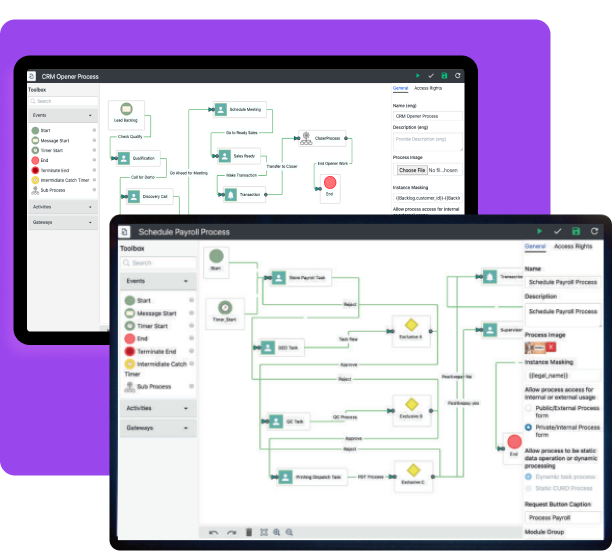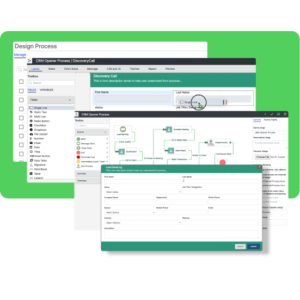Bitaffix Leverages the Power of OCR to propel your Work Processes into Digital Assets

By Zeeshan Bhukhari - 5 minute read
Table of Contents
Introduction
Have you ever marveled at a computer’s seemingly magical ability to interpret and understand words in an image, just like the brain’s eyes and brain? This unique feature is made possible thanks to Optical Character Recognition technology, especially when combined with BitAffix. It acts as a bridge between content and display systems, allowing computers to retrieve, understand, and use text from a variety of sources, such as books, receipts, manuscripts, invoices, and histories.
Thanks to BitAffix’s OCR capabilities, previously written and inaccessible images are becoming increasingly dynamic, flexible and searchable, allowing users to use this information for many tasks and activities.
What does Optical Character Recognition (OCR) mean?
OCR technology, especially when integrated with BitAffix, leverages industrial features to increase efficiency and accessibility in the digital age. It effectively extracts text from images, helping companies unlock valuable information in documents regardless of format or source. Additionally, It plays an important role in the invoice processing process, quickly converting written or handwritten information into digital documents, reducing errors and speeding up processing time. Additionally, It improves the ability to convert written text into digital format, helping people with disabilities find and engage with content more effectively. From providing administrative features to improving immunity, It continues to transform the industry and empower users worldwide, especially when combined with BitAffix.
In shot Optical Character Recognition is a technology that converts text into stored or photographed images for editing, storing or retrieving electronic documents. It is an important tool for companies that want to convert data in documents or photographs into electronic systems, especially when processing large volumes of documents.
How OCR Technology Works with BitAffix
BitAffix dominates in OCR technology, providing users with a modern solution seamlessly integrated into its platform. BitAffix’s OCR technology employs cutting-edge algorithms to meticulously analyze image pixels and recognize complex patterns resembling letters and numbers with incredible accuracy. This careful approach allows BitAffix to transform images with textual content – from documents, invoices, to handwritten notes – into highly searchable digital texts, ready for further processing and analysis. BitAffix stands out not only for its precision but also for its efficiency, enabling businesses to quickly convert large volumes of image-based data into actionable insights with minimal effort. Whether automating data entry tasks, digitizing documents, or improving access for all users, BitAffix’s advanced OCR technology serves as a pillar, driving innovation and productivity across a wide range of industries and applications.
It is a scanning tool used in various industries and departments in business processes because of its flexibility and efficiency. In digital content management, It performs two essential functions for any business: eliminating data entry and capturing information. Newly captured information becomes searchable and can even be started or added to a database as part of your business workflow.
Eliminating Data Entry
Data entry is common to many jobs, but it doesn’t have to be a manual task. BitAffix OCR simplifies data entry by recognizing characters (letters, numbers and symbols) in scanned documents or images and extracting the information directly from your computer or mobile device. This generated data can then be managed on a digital platform and stored in a digital archive for easy search and retrieval.
A strong indication of the enormous power of OCR in municipal administrative activities such as the preservation of historical documents. In Tompkins County, New York, more than 9,000 boxes of important documents and records have been scanned from 1817 to the present. This included meeting agendas, transcripts, citizen records and more, all of which were digitized, resulting in more than $5.5 million in storage cost savings for the state alone. In examining of these historical documents, Tompkins County staff used OCR’s tool to seamlessly integrate key information into an electronic records management system, making county history more accessible to both county employees and citizens.
Traditional Approaches to OCR
In the past, culture OCR methods leaned compactly on rule-based algorithms and template-matching strategies to decode characters within images. While these approaches manifest a degree of effectiveness, they scuffle with various challenges posed by newfangled data complexities. Complex font styles, degraded image quality, and handwritten text presented intimidating obstacles for traditional systems to gain mastery over. As a result, inexact errors were prevalent, leading to unacceptable performance in text recognition tasks. Despite their limitations, culture OCR methods laid the groundwork for successive advancements in the field, serving as the impetus for the evolution towards more sophisticated and robust OCR solutions.
Deep Learning Approaches to OCR Technology
Deep learning represents a groundbreaking paradigm shift in OCR technology, ushering in an era where machines can autonomously learn and adapt from vast datasets to enhance their accuracy continually. BitAffix stands at the forefront of this revolution, harnessing the power of deep learning algorithms to propel its OCR capabilities to new heights. By leveraging sophisticated neural networks, BitAffix empowers its OCR model to undergo iterative learning processes, gradually refining its understanding of diverse fonts, languages, and writing styles. This adaptive learning approach enables BitAffix’s OCR technology to evolve dynamically, ensuring unparalleled accuracy and performance across a broad spectrum of text recognition tasks. As a result, businesses can rely on BitAffix to deliver precise and reliable solutions that meet the demands of modern data processing workflows.
Advantages of Modern OCR Techniques
Greater accuracy – Modern techniques, especially those used by BitAffix, offer significantly higher accuracy rates compared to traditional methods, ensuring more reliable text extraction.
Amended speed – BitAffix’s OCR technology can analyze images and extract text at lightning speed, allowing for speedy document processing and analysis, thereby boosting overall efficiency.
Adaptability – BitAffix’s OCR technology is extremely capable and can handle divergent types of documents, Such as handwritten text, printed text, and even text embedded within images, providing pliability for various use cases.
Enhance language support – BitAffix’s sustains multiple languages, enabling businesses to process docs in different languages with ease and precision.
Seamless integration – It seamlessly integrates with existing systems and workflows, facilitating smooth implementation and enhancing productivity.
OCR technology, exclusively when integrated with BitAffix, plays an essential role in converting images into writeable and searchable text. With the evolved algorithms & deep learning endowment, BitAffix’s OCR technology provides exceptional accuracy, speed, and adaptability. Yet, it’s essential to observe the limitations of OCR and choose the right approach based on the specific requirements of your application.
Can BitAffix's OCR technology recognize handwritten text?
Yes, BitAffix’s OCR technology is capable of recognizing handwritten text with high accuracy.
What file formats does BitAffix support ?
The BitAffix supports a wide range of formats, such as JPEG, PNG, PDF, and TIFF, for OCR processing
How does BitAffix ensure the security of processed documents?
BitAffix employs robust security measures to protect OCR-processed documents, including encryption, access controls, and audit trails.
More To Explore


Fast Tracking App Delivery to fuel business growth
Breaking Barriers: Fast-tracking App Delivery to Fuel Business Growth By Zeeshan Bhukhari – 3 minute read Introduction In today’s rapidly progressing digital terrain, marked by


